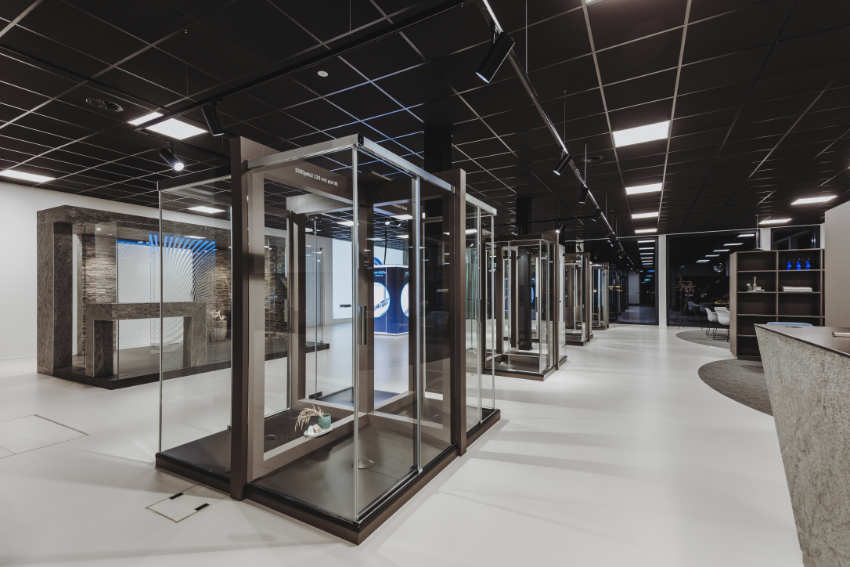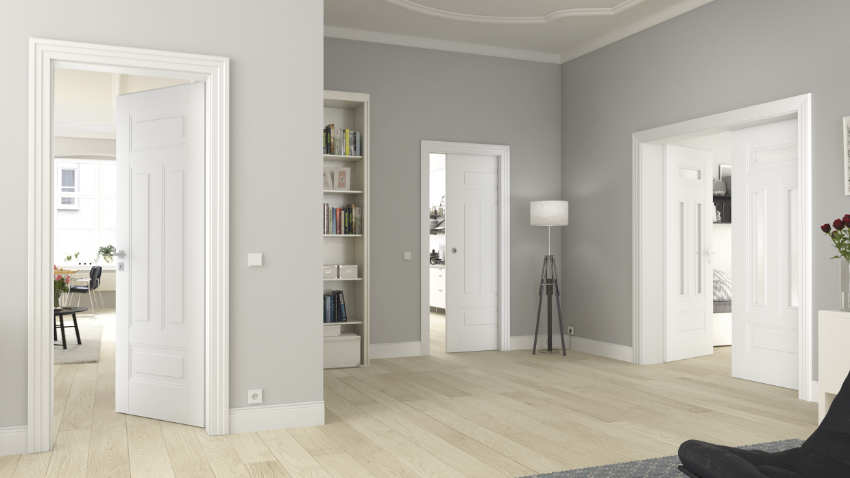Arbonia is a focused building components supplier with two divisions that are active in the areas of indoor climate and interior doors. Its main production sites are located in Switzerland, Germany, the Czech Republic, Poland, Serbia, Russia, Italy and Belgium.
Interview with Claudius Moor, CEO Doors Division & future CEO of Arbonia Group.
A brief description of the company and its activities.
Claudius Moor: Arbonia Doors consists of the two Business Units, Wood and Glass Solutions.
The Wood Solutions Business Unit, comprising of the companies Prüm, Garant, Invado, RWD Schlatter, Joro, Dimoldura, Rozière and Lignis is one of Europe’s leading providers of interior wooden doors and frames. The business unit has production sites in Germany, Switzerland, Poland, Spain, Portugal, France and in the Czech Republic . In the domestic markets, it offers its customers a comprehensive range of products from standard doors to complex functional doors.
As a specialist for shower enclosures and glass systems, the Glass Solutions Business Unit offers impressive solutions for all generations, lifestyles, and types of residences. Thanks to its strong brands Kermi, Koralle, Baduscho and Interwand, it is the market leader in Europe. In addition to the integrated production sites in Germany and the locally oriented manufacturing in Switzerland, it operates internationally through distribution companies.

What are the main areas of activity of the company?
C.M: Arbonia is a leading producer and seller of interior doors from wood and glass in Europe. With highly-automated production sites and processes, it is able to offer both large quantities of standard doors, as well as customized doors made-to-order for complex technical requirements (such as fire or radiation protection), both with a quick turnaround time. These doors are both for residential and non-residential construction and also used in new construction, as well as renovation. With its Business Units it serves the markets in the DACH region (Germany, Austria, Switzerland), Central and Eastern Europe (Poland, Czech Republic, Slovakia, Slovenia, Hungary) and Southwest Europe (Spain, Portugal, France).
What’s the news about new products/services?
C.M: With the acquisition of Dimoldura and Lignis, Arbonia is on one hand entering the Southwest European markets, as well as the project business in Eastern Europe. On the other hand, the acquisitions expand the product range to doors from solid wood, as well as veneer doors. Additionally, Arbonia has successfully entered the DIY market, equipping a large German DIY-chain as of 2024.
What are the ranges of products/services?
C.M: Arbonia and its brands offer a wide range of wooden interior doors with optional features, such as improved fire protection or sound insulation. 6000 different surface/edge colour combinations are possible, with the batch size starting at one. These made-to-order doors can be fully digitally ordered, that means configured both online or with POE (point of experience) stations available at wholesalers. This configuration process, similar to that of car makers, allows for a truly customizable product.

Furthermore, shower enclosures and partitions made of glass and special doors made of steel and aluminum, these can also be completely customized for any application. We offer cross-brand and cross-product planning support and technical support for all projects, from the planning process all the way to service and replacement of damaged doors.
What is the state of the market where you are currently active?
C.M: Arbonia Doors has to contend with a difficult market environment, primarily in Germany, but to a lesser degree also in other European markets. On the one hand, we experienced a drastic volume decrease, mainly for standard doors in new construction as well as in renovation, which was caused by high construction material prices and interest rates. On the other hand, high energy costs had a noticeably negative impact. These had an immediate negative impact on the profitability of construction projects, thus also impacting projects that are still in the planning stage. As a result of this, the significant decline in residential construction in Germany, the most important market, also had a disproportionate impact on the wholesalers business. Glass products in particular are also affected by price increases, since their production is extremely energy-intensive. We are also dealing with an extreme shortage of skilled workers on construction sites, hampering installations additionally.
The medium- to long-term perspectives are very promising though, as the varying input costs are normalizing, while the demand is constantly growing due to migration, urbanization and an ageing building stock.
What can you tell us about market trends?
C.M: There is an increasing demand for doors that are both energy-efficient and environmentally friendly, in their use, as well as in their production. Wood is particularly popular due to its natural aesthetics and renewable characteristics. Arbonia is addressing this trend by focusing on the usage of FSC certified wood and the installation of modern and efficient combined heat and power plants (CHP). These burn sawdust and wooden residues from the production to cover a large part of the factory’s energy needs, as well as all the heat required without pollution.

Another trend is the increased use of smart door systems that can also be connected to home automation systems. These systems, that are gaining in popularity are another pillar our digital strategy. With a participation in KIWI, Arbonia is also offering digital entry systems for buildings. The systems allow the (un-) locking of doors via smartphone and a digital access rights management, so that access can be given to installers and maintenance personnel without handing out manual keys.
A third trend, particularly visible in Germany, is the rising number of multi-family homes, whereas the number of single- and two-family homes is steadily decreasing.
What are the most innovative products/services marketed?
C.M: One of the most important differentiating features of doors is the edging technology, since the edging is the most technologically demanding part of door manufacturing. We put a new cast edging system into operation, which gives door profiles an edge coating made of polyurethane (plastics or synthetic resins). This technology ensures a particularly rugged edge formation in the case of higher requirements. It is used in particular with functional doors in heavily frequented buildings where components are subjected to especially high stresses. This is the case, for example, in hospitals, hotels, retirement and nursing homes, as well as schools.
Arbonia also launched the new “DOORIT – The platform for doors”. This allows more efficient cooperation with specialist trade partners in the areas of configuration, quotation preparation and order processing.

What estimations do you have for 2024?
C.M: The year 2024 is expected to remain challenging, since there is little reason to expect a significant improvement of the market conditions in the short term. The sharp decline in building permits is likely to result in further volume decreases. For this reason, we have already taken various measures, largely in the wholesalers business, to compensate for potential decreases. These measures include consistently driving expansion of the project business and exports, for example.
Arbonia is optimistic about the future, though. Germany, the largest European market in general, but also for our business, is expected to grow further in the new building segment due to the housing shortage, especially in metropolitan areas. A recovery is also expected in the renovation segment.

